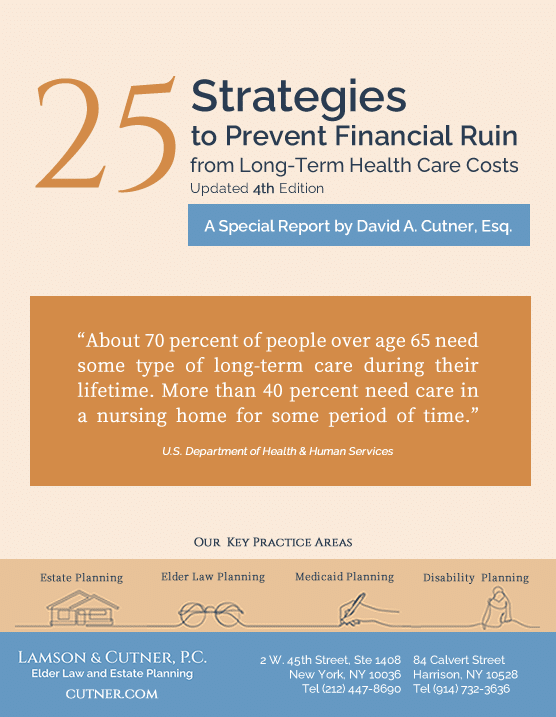This is Strategy #12 from Lamson & Cutner’s publication, “25 Strategies to Prevent Financial Ruin from Long-Term Health Care Costs.” Click here to see the other strategies.
If you are approaching retirement, and have an option to receive either a stream of income or a lump sum distribution from a pension or retirement account, it may be better to take the lump sum. Here’s why.
If you eventually need nursing home care, any income streams you receive from your pension, deferred compensation, or other plan, will go to the nursing facility. It’s a Medicaid requirement, and a way of forcing you to pay for at least part of your care.
If you take the lump sum option, the payout will be considered your asset. You’ll have the opportunity to protect that money by putting it in an asset protection trust.
Legally, once the money is in a trust, you don’t own it anymore. Yet the trust can be constructed so that money can be made available for your needs. In this way, although by law the money is no longer yours, you can still benefit from it. That means it helps you maintain your quality of life, and whatever is left after you pass on can go to your loved ones.
By transferring your lump sum distribution to a trust, you may no longer have to use that money to pay for a nursing facility. Then you’ll be eligible for Medicaid to pay all or a significant part of the cost, depending on whether the transfer was made beyond the “look back” period (see Strategy No. 3), or other planning was done (see Strategy No. 14).
In a case involving a widow in her 70’s, suffering from Alzheimer’s disease and other health problems, Lamson & Cutner assisted her in successfully obtaining Medicaid home care using this lump sum strategy. Money was taken from an IRA, and the after-tax balance was placed in a protective trust. Excess income was transferred to a Pooled Income Trust. With this planning, she was able to retain the benefit of her financial reserves, instead of having to “spend down” her resources under Medicaid eligibility requirements.
We then filed a Medicaid application for home care, which was approved. This allowed her to maintain her sense of personal dignity, by receiving the health services she needed in the comfort and security of her own environment. Down the road, she may need nursing home care, but by then the money that she took from her IRA will remain protected, as long as it was put in the trust beyond the “look back” period (discussed above in Strategy No. 3).
visit our key practice areas


